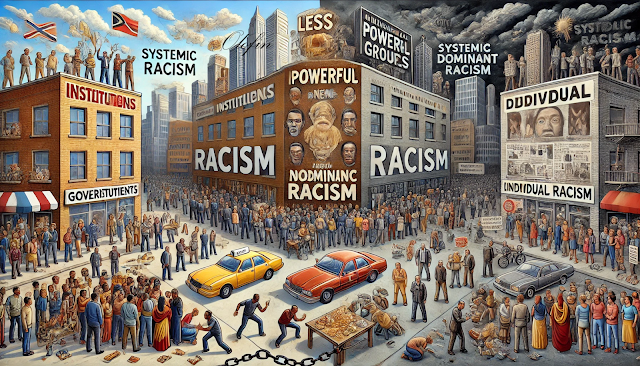Can a Less Influential Or Non-Dominant Group Practice Racism?
Can a Less Influential or Non-Dominant Group Practice Racism?
This is a complicated question, often debated, and it's best answered by how one defines "racism." There are two main perspectives:
Racism as a Power Structure:
Argument: If racism is understood as requiring systemic power—political, economic, or social structures—then a less powerful or non-dominant group without such infrastructure might not be capable of practicing racism in the full systemic sense. This definition is based on how institutions and power dynamics maintain racial inequalities.
Example: If a small ethnic group has no influence over broader societal laws, policies, or economic structures, it doesn't have the means to enforce racial discrimination on a large scale. Their biases or prejudices might be harmful but wouldn’t amount to "racism" in the genuine sense.
Racism as Individual Bias and Discrimination:
Argument: Others argue that racism can exist at an individual level, independent of further power structures. From this position, any person or group can be racist if they harbor and act upon prejudices against others based on perceived race, regardless of whether they belong to a dominant or marginalized group.
Example: If members of a marginalized community harbor discriminatory views or act violently against another race, that can still be considered racism, even though they don’t have institutional power.
Cultural Dominance and Racism
Infrastructures of Power: Racism as a global or systemic phenomenon is typically sustained by powerful structures—laws, policies, media, educational systems, economic systems—that favor one racial group over others.
Historically, colonial powers like European nations, which had vast resources and military might (including nuclear capabilities in modern times), enforced racial hierarchies worldwide.
Cultural Influence:
A culture that dominates globally, either through economic power, media, technology, or military strength, is more capable of spreading its racial biases and practices on a large scale.
However, racism doesn’t exclusively require global dominance. Even within a smaller circle (a community, institution, or country), groups can wield enough power to practice racism against others. For example, apartheid South Africa was not globally dominant, but it had sufficient local power to enforce systemic racism.
While power and infrastructure play crucial roles in perpetuating systemic racism, the absence of global dominance or nuclear capabilities doesn’t preclude a group from engaging in racist behavior or attitudes.
Racism can exist in various forms and levels—individual, institutional, or systemic—regardless of whether a group holds global power. It’s the combination of prejudice with power that allows racism to become deeply entrenched and damaging, but even without such power, individuals and communities can still exhibit racist behavior and discrimination.
Olofin [ 4Qua Of Orion ]





Comments
Post a Comment